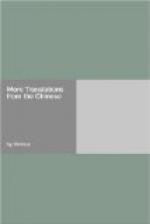[2] I.e., performing the functions of a wife.
[3] Who, surrounded at the battle of Kai-hsia (202 B.C.), gave his horse to a boatman, lest it should fall into the hands of the enemy.
[61] ILLNESS
[Written circa 842, when he was paralyzed]
Dear friends, there is no
cause for so much sympathy.
I shall certainly manage from
time to time to take my walks abroad.
All that matters is an active
mind, what is the use of feet?
By land one can ride in a
carrying-chair; by water, be rowed in a boat.
[62] RESIGNATION
Keep off your thoughts from
things that are past and done;
For thinking of the past wakes
regret and pain.
Keep off your thoughts from
thinking what will happen;
To think of the future fills
one with dismay.
Better by day to sit like
a sack in your chair;
Better by night to lie a stone
in your bed.
When food comes, then open
your mouth;
When sleep comes, then close
your eyes.
YUUAN CHEN
[A.D. 799-831]
[63] THE STORY OF TS`UI YING-YING
During the Cheng1-Yuuan[1] period of the T`ang dynasty there lived a man called Chang.[2] His nature was gentle and refined, and his person of great beauty. But his deeper feelings were resolutely held in restraint, and he would indulge in no license. Sometimes his friends took him to a party and he would try to join their frolics; but when the rest were shouting and scuffling their hardest, Chang only pretended to take his share. For he could never overcome his shyness. So it came about that though already twenty-three, he had not yet enjoyed a woman’s beauty. To those who questioned him he answered, “It is not such as Master Teng1-t’u[3] who are true lovers of beauty; for they are merely profligates. I consider myself a lover of beauty, who happens never to have met with it. And I am of this opinion because I know that, in other things, whatever is beautiful casts its spell upon me; so that I cannot be devoid of feeling.” His questioners only laughed.
[1] A.D. 785-805.
[2] I.e., Yuuan Chen1 himself.
[3] Type of the indiscriminate lover, fourth century B.C.
About this time Chang went to Puchow. Some two miles east of the town there is a temple called the P`-u-chiu-ssu, and here he took up his lodging. Now it happened that at this time the widow of a certain Ts`ui was returning to Ch`ang-an.[4] She passed through Puchow on her way and stayed at the same temple.
[4] The capital of China at that time; now called Hsi-an-fu.
This lady was born of the Cheng1 family and Chang’s mother was also a Cheng1. He unravelled their relationship and found that they were second-cousins.
This year General Hun-Chan[5] died at Puchow. There was a certain Colonel Ting Wen1-ya who ill-treated his troops. The soldiers accordingly made Hun Chan’s funeral the occasion of a mutiny, and began to plunder the town. The Ts`ui family had brought with them much valuable property and many slaves. Subjected to this sudden danger when far from home, they had no one from whom they could seek protection.




